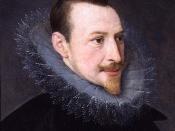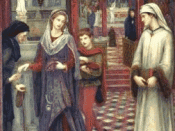Francesco Petrarch, often considered the first modern poet, was also one of the first humanists. Throughout his life he was a seeker of the classics and was instrumental in introducing them to his contemporaries. He is seen as a forerunner of the Renaissance.
He was born in 1304 in Arezzo and died in Arqua in 1374. His family moved several times in his young life before settling down near Avignon. His father wanted him trained as a lawyer and he did begin that training in Montpellier and Bologna. Upon the death of his father in 1326 however, Petrarch left his law studies and returned to Avignon. He quickly entered into the gay and fashionable life there and seeped himself in classic poetry. He also took minor orders, which permitted him to enjoy all the church benefices and only bound him to the daily reading of his Office. It was in Avignon, on Good Friday in 1327 that he first saw Laura, the lady who was to be the inspiration of his most famous work.
Some have identified her with Laura, the wife of Hugues de Sade who died in April of 1348. (Which is when Petrarch, wrote in the flyleaf of his copy of Virgil "that light was taken from our day".) Petrarch composed several hundred sonnets and verses to his love--his unrequited love--and published them in manuscript form as the "Canzoniere" or Songbook. His fame spread throughout the land and his perfection of the sonnet form later influenced such English poets as Geoffrey Chaucer, William Shakespeare, and Edmund Spenser. (Durant 5-9)
At this time, all learned people read and even spoke Latin. This was the Latin of the church, and the Universities and Scholasticism--not the Latin of the ancient Romans. Petrarch loved the language of the ancients...


